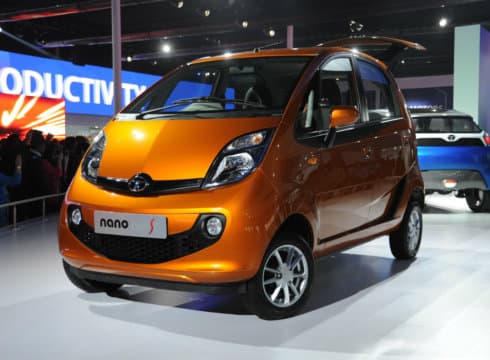The Mumbai Headquartered Automaker Recently Conducted A Secret Road Test Of Nano EV In Coimbatore
Inc42 Daily Brief
Stay Ahead With Daily News & Analysis on India’s Tech & Startup Economy
At a time when the future of the world’s cheapest car Nano hangs by a thread, Tata Motors has reportedly made a secret foray into the electric vehicle space. The Mumbai-headquartered multi national automaker recently conducted a road test of the Nano EV in Coimbatore.
According to sources close to the development, the test was successfully performed in the presence of Tata Sons’ Chairman Emeritus Ratan N Tata.
Competing against homegrown Mahindra & Mahindra’s newly-launched electric vehicle e2oPlus, the Tata Nano EV will come equipped with a lithium battery-powered electric motor.
By making the move to Nano EV, Tata Motors is likely looking to boost sales of Nano, which has been dropping steadily over the last few years.
From Tata Nano To Nano EV
At the time of its launch in 2009, Tata Nano made headlines for its attractive price tag of just INR 100K. In the nine years since then, the vehicle has lost much of its charm among car buyers in India.
In FY17, only around 7,591 units of the mini car were sold, which is less than the monthly sale volume of Tata Tigor and Tata Tiago. Despite the fact that less than 167 units of Nano have been sold in the month of June, the car continues to be made in the company’s Sanand plant in Gujarat.
At the recently-held 72nd annual general meeting of Tata Motors, shareholders voiced their concerns about the future of the company, in particular, its mini car Nano.
In response, Tata Motors Chairman Natarajan Chandrasekaran said, “We have issues we need to sort out. We will take a call which car needs to be stopped. It’s not about switching one car on and one car off. Overall, we have a very low base in the passenger car segment. As I said upfront on a $43.7 Bn (INR 280,000 Cr) revenue on a consolidated basis, the passenger car business is about $1.4 Bn (INR 9,000 Cr). We are talking of 3%.”
The Huge Potential Of The Electric Vehicle In India
According to a report by the Society of Manufacturers of Electric Vehicles, there has been a 37.5% rise in the sale of the electric vehicle in India in recent years. In addition to working towards switching to 100% electric vehicles by 2030, the Indian government agreed to bear up to 60% of the research and development (R&D) costs for developing the indigenous low-cost electric technology in January 2017.
Later in May, it was reported that the government is looking to seal a deal with SoftBank for low-interest funding of around 200K electric buses to be deployed in public transport. To cut losses on one of its biggest investments in India, Japanese firm SoftBank reportedly even announced plans to turn Ola into an electric car manufacturer.
In the same month, Maharashtra Chief Minister Devendra Fadnavis inaugurated the first multi-modal electric vehicle project in India, along with an Ola electric charging station in Nagpur, in order to celebrate the third anniversary of the Narendra Modi-led government.
A month later, Tesla CEO Elon Musk said that his company was in talks with the Indian government for import exemption on EVs. In July, Mercedes Benz Managing Director of India Roland Folger urged the central government to offer incentives for electric vehicle manufacturing. The German automaker claimed that it would be able to introduce electric vehicles in India by 2020, provided it receives adequate support from regulatory authorities.
Most recently, Mumbai-headquartered JSW Energy announced plans to launch electric vehicles (EVs) in India by 2020. To that end, the company has promised $545.72-623.68 Mn (INR 3,500-4,000 Cr) for the next three years.
As India aims to become an electric vehicle nation over the next decade, it is heartening to see traditional car manufacturers take a keen interest in the space. But, whether this entry into the electric vehicle space with the Nano EV will help Tata Motors enhance its performance in the domestic market is something that remains to be seen.
(The development was reported by Business Line)
{{#name}}{{name}}{{/name}}{{^name}}-{{/name}}
{{#description}}{{description}}...{{/description}}{{^description}}-{{/description}}
Note: We at Inc42 take our ethics very seriously. More information about it can be found here.


